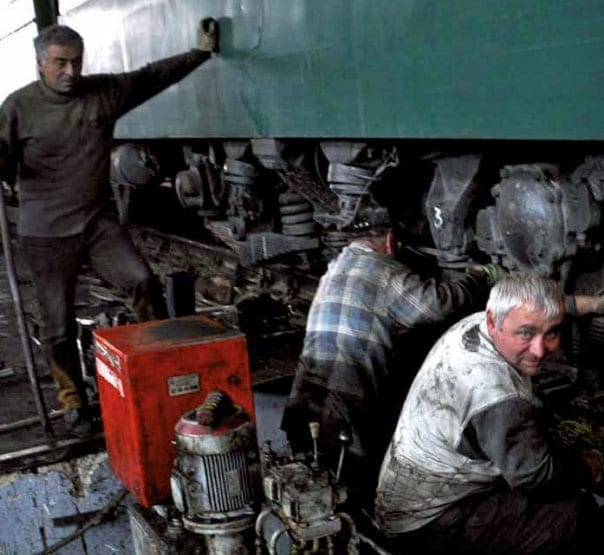
Jun 10, 2015
Belarus, China and Colombia are countries with the worst worker rights violations in the world, while the Middle East and North Africa is the world’s worst region when it comes to fundamental rights at work, according to the 2015 Global Rights Index released today.
“Workers in Colombia and Guatemala have been murdered for trying to negotiate better working conditions, while in Qatar and Saudi Arabia migrants continue to endure forced labor and labor law exclusions which amount to modern slavery,” says Sharan Burrow, general secretary of the International Trade Union Confederation (ITUC), which issued the report. Union members were murdered in 11 countries, an increase of one from the last report, including 22 deaths in Colombia alone.
The other top 10 worst countries for working people are Egypt, Guatemala, Pakistan, Qatar, Saudi Arabia, Swaziland and United Arab Emirates.
“In 73 of 141 countries, workers faced dismissals, suspensions, pay cuts and demotions for attempting to negotiate better working conditions, while in 84 countries employers adopted illegal strategies to deny or delay bargaining with representative trade unions,” says Burrow.
The report notes a worrying trend in the “immense increase in the number of arbitrary arrests and detentions of workers for exercising their rights in a legitimate and peaceful manner” with the number of countries where such violations were reported rising from 35 in 2013–2014 to 44 in 2014–2015 and now includes countries such as Spain and Brazil.
The Index ranks countries based on the frequency with which worker rights are violated, and finds that worker rights in eight countries have diminished since last year: Burundi, Dominican Republic, Hong Kong, Special Administrative Region of China, Iran, Georgia, Russia, United Kingdom and Spain.
Five countries received perfect scores: Austria, Finland, Netherlands, Norway and Uruguay. The report finds that two countries, Mozambique and Lesotho, have made notable improvements.
“The World’s Worst Countries for Workers” also finds:
- In nearly 60 percent of the 141 countries ranked, certain categories of workers are excluded from fundamental labor rights.
- 70 percent of countries deny the right to strike to some or all workers.
- Two-thirds of countries deny workers collective bargaining rights.
- More than half of countries in the survey deny workers access to the rule of law.
The report, which the ITUC has issued annually for the past 30 years, connects deteriorating worker rights and inability to freely form unions with the world’s increasing global economic inequality, where more than 1.2 billion people live in extreme poverty.
Download the full report, which includes a country-by-country description, maps and graphics.
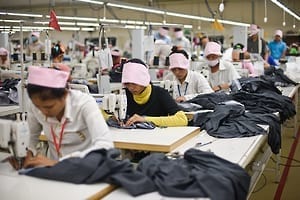
Jun 9, 2015
Cambodia’s draft trade union law would violate the right to organize and be a major step backward for workers, Human Rights Watch said yesterday in a letter to Cambodian Prime Minister Hun Sen.
The Cambodian government has told the media that the trade union law will be enacted in 2015, but has not made a draft public nor provided opportunities for feedback from workers, unions or the public.
Solidarity Center Cambodia Program Director David Welsh says he has seen the draft law, and it does not serve the interests or unions or workers.
“New labor laws and trade union laws were supposed to expand and protect the rights of workers and the freedom of trade unions, not circumscribe them in the way that this current draft law’s doing,” Welsh says. The Solidarity Center has long raised the need for a new trade union law that is grounded in strong worker protections based on internationally accepted standards.
“If the government doesn’t change track, it will be extremely damaging going forward for the reputation of Cambodia as an investment country, and as a viable garment sector as well.”
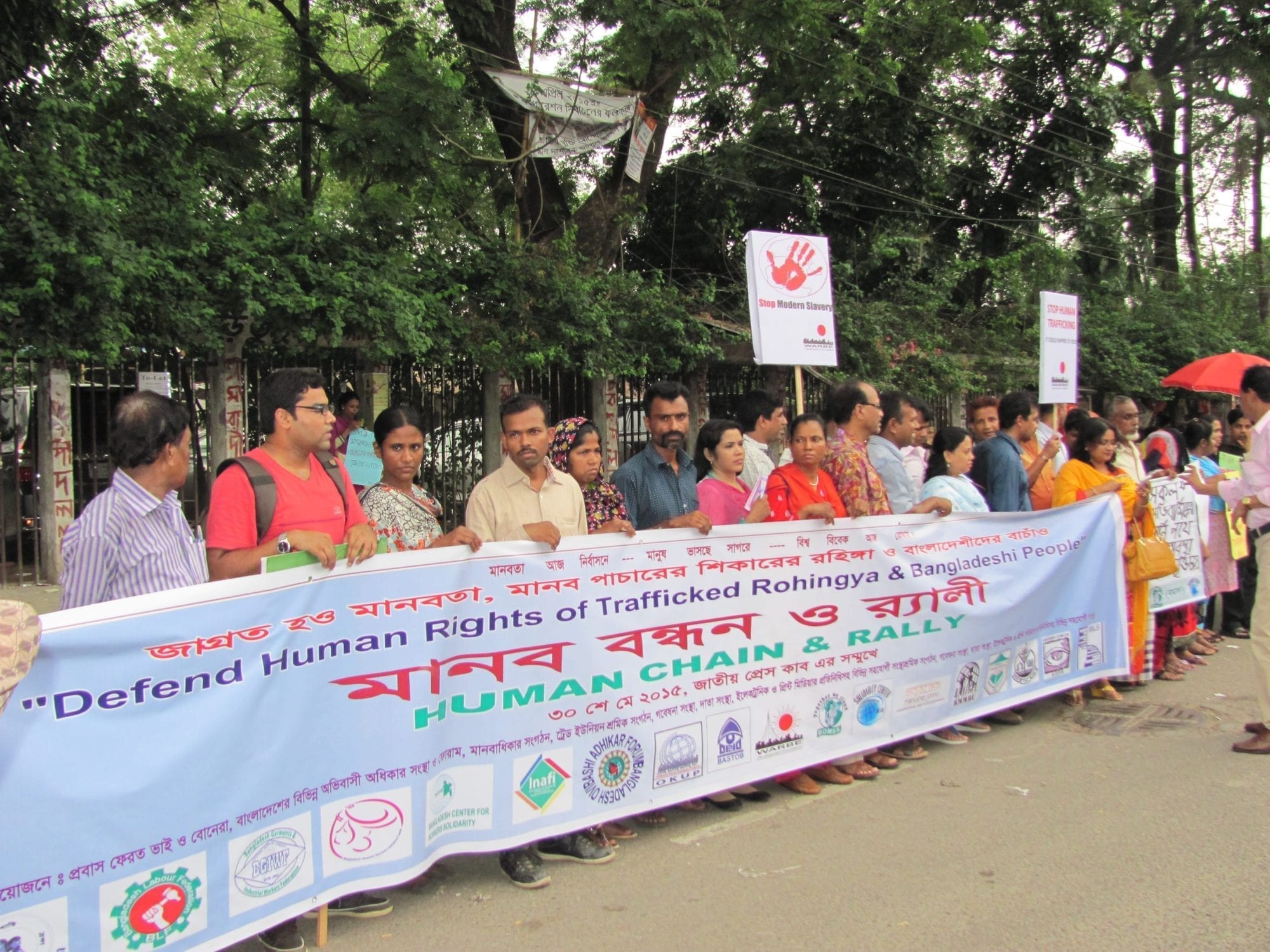
Jun 5, 2015
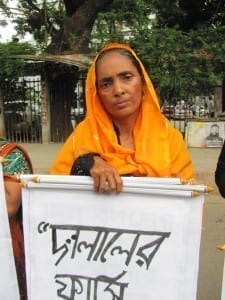
Selina Begum’s son has been missing at sea since he migrated for work. Credit: Solidarity Center/Mushfique Wadud
Selina Begum, 60, traveled from Bangladesh’s northeast Narshindi district to Dhaka, the capital, for one reason, she says: “I want to know the whereabouts of my son.”
Selina’s son, Taizul Islam Rakib, 22, is among the thousands of workers and their families who have migrated overseas to find jobs. Selina says she glimpsed her son in a television news story on the plight of migrants abandoned on boats, but has not heard from him.
Over the weekend, Selina joined dozens of those with missing loved ones in a human chain in downtown Dhaka, where they carried signs, “Punish the trafficking traders,” and held a press conference demanding the government take action. They were joined by repatriated victims of human trafficking like Abdur Rahman, 40, who was rescued from Malaysia and returned to Bangladesh.
“I did not get anything to eat for 22 days and just survived by eating tree leaves,” Abdur said, describing his journey to Malaysia.” “I never thought I would survive.”
Fulmoti, 35, has been waiting for a phone call from her husband Faruk Hossain, 40, who set out for Malaysia by sea on April 14. “My morning starts with the hope that my husband would phone me, but every night I go to bed feeling hopeless,” says Fulmoti, a mother of two.
The event was organized by 19 labor and human rights organizations, including the Solidarity Center and its allies, the Bangladesh Center for Workers Solidarity (BCWS), the Bangladesh Garment and Industrial Workers Federation (BGIWF) and the Bangladesh Independent Garment Workers Union Federation (BIGUF). The coalition issued a joint statement urging governments in origin and destination countries to take immediate action to repatriate migrants and punish traffickers.
Speaking at the event, Syed Saiful Haque, chairman of WARBE Development Foundation, a Bangladesh emigrant rights group, said that the immediate repatriation of trafficking victims should be governments’ first priority. In addition, said Syed Sultan Uddin Ahmmed, assistant executive director of the Bangladesh Institute of Labor Studies, the government must take action against the leaders of trafficking chains.
The event stems from a decision by members of WARBE, the Bangladeshi Ovhibashi Mohila Sramik Association (BOMSA) and Solidarity Center to work together in raising the issue of trafficked migrants. The group is asking the Bangladesh government to take steps to repatriate trafficking victims and rehabilitate them; demanding prosecution of traffickers; and urging the government to work with other concerned governments to prevent stop criminal trafficking.
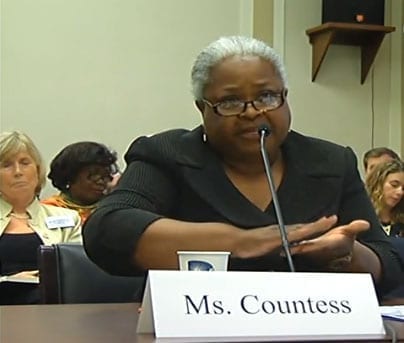
Jun 4, 2015
Zimbabwe’s economy is in deep decline, making it harder for average Zimbabweans to work and live, and leaving them less and less confident in their future, according to Solidarity Center Regional Program Director for Africa Imani Countess, in testimony yesterday on Capitol Hill.
“Most workers earn salaries far below the poverty level, and many workers—even in the formal sector—go for months without receiving their wages,” Countess said. (Read her full testimony here.)
Countess was among three panelists speaking at a hearing on the Future of U.S.-Zimbabwe Relations, held by the U.S. House Subcommittee on Africa, Global Health, Global Human Rights, and International Organizations.
She cited a recent AfroBarometer survey of 2,400 randomly selected participants that details the extent of Zimbabwe’s economic crisis:
- 33 percent of respondents in urban areas had gone without food at least once this year.
- 52 percent in urban areas had gone without medical care.
- 59 percent in urban areas had gone without water.
- Nearly two-thirds say “unemployment is the biggest problem government should address.”
According to the Zimbabwe Congress of Trade Unions, Countess said, “most human rights defenders, like trade unions and civic organizations have been severely weakened due to economic decline as well as brain drain.”
Countess told lawmakers that Zimbabwe labor unions and workers are looking for U.S. policy that includes strong support for human rights defenders and community-based, mass organizations that work to educate and organize citizens around a rights-based culture. Zimbabwe unions also seek U.S. support to provide stronger protection for informal economy workers, that in turn, can positively influence the flow of economic migrants.
Other panelists included Shannon Smith, U.S. State Department deputy assistant secretary for the Bureau of African Affairs and Ben Freeth, Mike Campbell Foundation executive director.
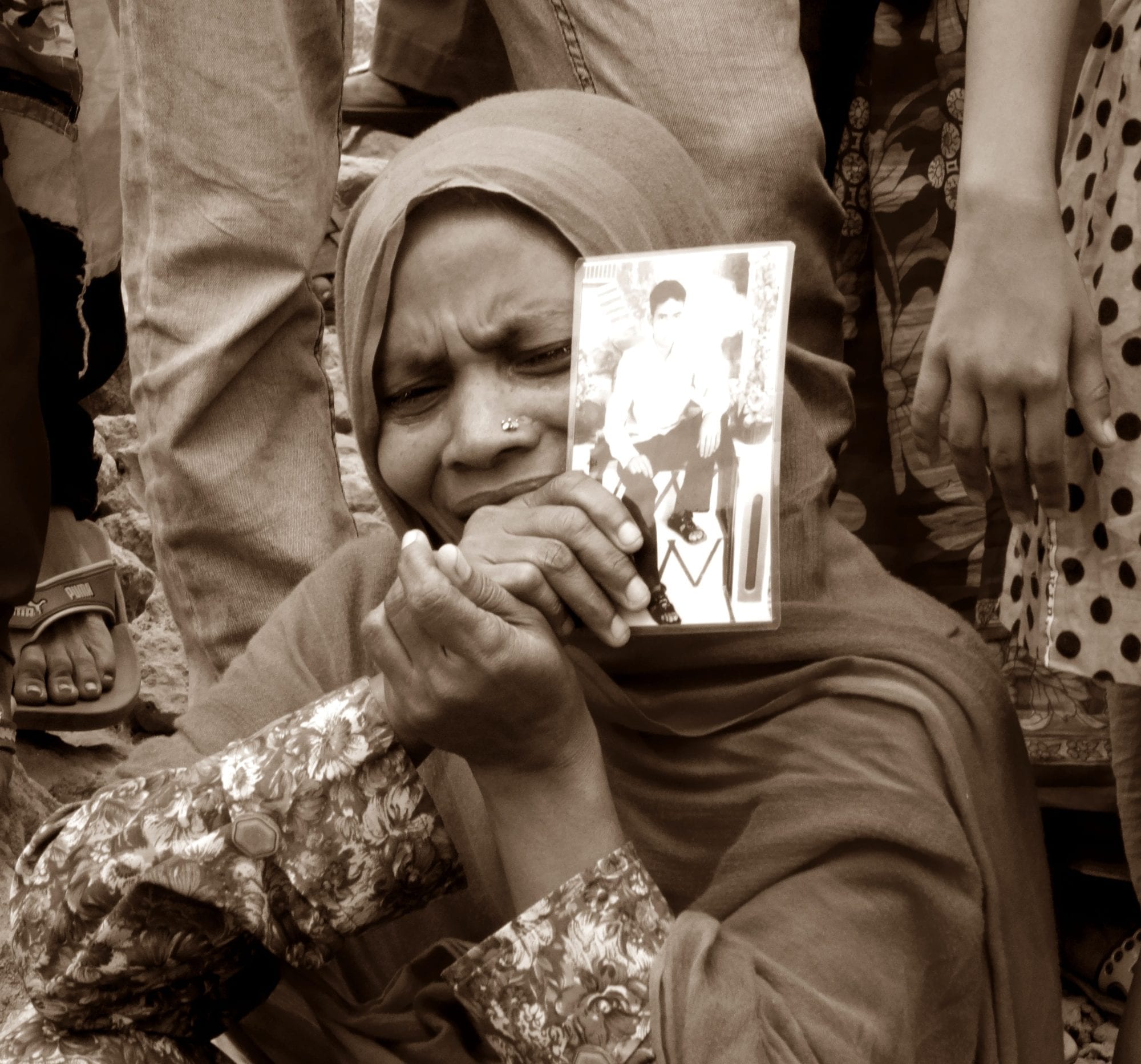
Jun 2, 2015
Reports that at least 41 government officials have been charged in the deadly 2013 collapse of Rana Plaza in Bangladesh “represent a long-delayed step toward justice,” says Solidarity Center Asia Regional Program Director Tim Ryan.
“Finally, after more than two years, the Bangladesh government is moving toward holding accountable those who were responsible for the deaths and injuries of hundreds of women and men toiling for pennies in those five garment factories,” Ryan says. “Rana Plaza was the Bangladesh’s worst-ever industrial disaster, and ensuring the justice process works is the absolute minimum the government can do for those who lost loved ones or were injured in the Rana Plaza disaster.”
Sohel Rana, the owner of the building; his parents, the owners of several factories in the building; and at least a dozen government officials were formally charged yesterday, according to the New York Times, citing a state prosecutor, Anwarul Kabir, who is part of the legal team that will pursue the case. At least 17 individuals have been charged with murder, while others face lesser charges, like violating building codes.
More than 1,100 garment workers, mostly women, were killed when the multistory Rana Plaza building pancaked on April 24, 2013. Thousands more were severely injured, many of them now unable to work and support their families. The building housed five garment factories.
A Bangladesh government inquiry in May 2013 concluded that substandard construction materials and the vibration of heavy machinery in the five garment factories were prime triggers of the building’s collapse. Sohel Rana, a prominent leader in the nation’s ruling party, was arrested shortly after over the disaster as he tried to flee to India.
A structural engineer inspecting the building the day before it collapsed found structural cracks, and retail workers in the building were told to stay home. Despite the engineer’s warnings, Rana told factory operators the building was safe. Factory owners then demanded workers return the next day and work; some were threatened with the loss of a month’s pay if they did not go back to the factory floor.
If convicted, the accused could face the death penalty, according to the New York Times, citing Bijoy Krishna Kar, the investigating officer who filed the charges on Monday.
Bangladesh garment factories are notoriously unsafe. Although Rana Plaza served as wake-up call to authorities, factory owners and Western brands, who are now taking steps to remedy the situation, workers still are injured or die on the job. According to data gathered by the Solidarity Center in Bangladesh since November 2012, the garment sector has seen at least 84 fire incidents injuring more than 900 workers and killing more than 31 workers.






